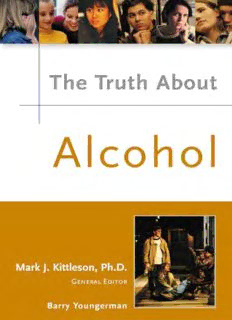
The Truth About Alcohol (Truth About Series) PDF
Preview The Truth About Alcohol (Truth About Series)
THE TRUTH ABOUT ALCOHOL THE TRUTH ABOUT ALCOHOL MARK J. KITTLESON, PH.D. Southern Illinois University General Editor WILLIAM KANE, PH.D. University of New Mexico Adviser RICHELLE RENNEGARBE, PH.D. McKendree College Adviser Barry Youngerman Principal Author The Truth About Alcohol Written and Developed by BOOK BUILDERS LLC Copyright ©2005 by BOOK BUILDERS LLC All rights reserved. No part of this book may be reproduced or utilized in any form or by any means, electronic or mechanical, including photocopying, recording, or by any information storage or retrieval systems, without permission in writing from the publisher. For information contact: Facts On File, Inc. 132 West 31st Street New York NY 10001 Library of Congress Cataloging-in-Publication Data The truth about alcohol / Mark J. Kittleson, general editor; William Kane, adviser; Richelle Rennegarbe, adviser; Barry Youngerman, principal author. p. cm. Includes index ISBN 0-8160-5298-0 (hc: alk. paper) 1. Teenagers—Alcohol use. 2. Alcoholism—Prevention. I. Youngerman, Barry. II.Kittleson, Mark J., 1952– RJ506.D78F33 2004 362.292′0835—dc22 2004000509 Facts On File books are available at special discounts when purchased in bulk quan- tities for businesses, associations, institutions, or sales promotions. Please call our Special Sales Department in New York at (212) 967-8800 or (800) 322-8755. You can find Facts On File on the World Wide Web at http://www.factsonfile.com Text design by David Strelecky Cover design by Cathy Rincon Graphs by SholtoAinslie, PatriciaMeschino Printed in the United States of America MP Hermitage 10 9 8 7 6 5 4 3 2 1 This book is printed on acid-free paper. CONTENTS List of Illustrations vii Preface ix How to Use This Book xi Addictive Behaviors and Alcohol 1 A to Z Entries 15 Advertising and Counteradvertising Campaigns 17 Alcohol, History of 20 Alcohol Abuse, The Risks of 28 Alcohol and Disease 38 Alcohol and Violence 47 Alcoholism, Causes of 56 Binge Drinking Among Teenagers 62 Birth Defects and Alcohol 68 Children of Alcoholics 72 Choices, Responsible 77 Drinking and Driving 82 Drinking and Drugs 92 Drinking on College Campuses 102 Effects of Alcohol on the Body 113 Hangover 123 Law and Drinking, The 128 Peer Pressure and Alcohol 135 Recovery and Treatment 139 Risk-Taking 149 Self-Help Programs 154 Sexual Behavior and Alcohol 160 Underage Drinking 169 Hotlines and Help Sites 175 Glossary 179 Index 187 LIST OF ILLUSTRATIONS One Drink Equals . . . 24 The Costs of Alcohol Abuse in the United States, 1998 36 Youth Violence and Substance Abuse 48 A Month’s Alcohol Use by Age Group 66 Heavy Use of Alcohol Declines with Age 78 Percentages of Alcohol-Involved Drivers by BAC Levels, Gender, and Age 83 Leading Causes of Death for People Ages 15–20 84 Percentage of Persons Aged 12 or Older Reporting a Month’s Binge Alcohol Use, by Age Group, 2000 94 Heavy Drinking by Age 103 Harmful Effects of Alcohol on Nutrition 117 Percentage of Population Receiving Alcohol or Illicit-Drug Treatment 144 The Twelve Steps 156 Percent of Crimes Involving Alcohol Abuse 162 vii PREFACE In developing this series, The Truth About, we have taken time to review some of the most pressing problems facing our youth today. Issues such as alcohol and drug abuse, depression, family problems, sexual activity, and eating disorders are at the top of a list of growing concerns. It is the intent of these books to provide vital facts while also dispelling myths about these terribly important and all-too-common situations. These are authoritative resources that kids can turn to in order to get an accurate answer to a specific question or to research the history of a problem, giving them access to the most current related data available. It is also a reference for parents, teachers, counselors, and others who work with youth and require detailed information. Let’s take a brief look at the issues associated with each of those topics. Alcohol and drug use and abuse continue to be a national con- cern. Today’s young people often use drugs to escape the extraordi- nary pressures of today. In doing so they are losing their ability to learn how to cope effectively. Without the internal resources to cope with pressure, adolescents turn increasingly back to addictive behav- iors. As a result, the problems and solutions are interrelated. Also, the speed with which the family structure is changing often leaves kids with no outlet for stress and no access to support mechanisms. In addition, a world of youth faces the toughest years of their lives, dealing with the strong physiological urges that accompany sexual desire. Only when young people are presented the facts honestly, without indoctrination, are they likely to connect risk taking with cer- tain behaviors. This reference set relies on knowledge as the most important tool in research and education. ix
